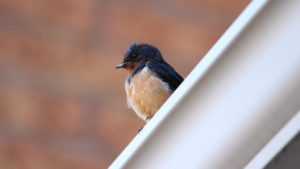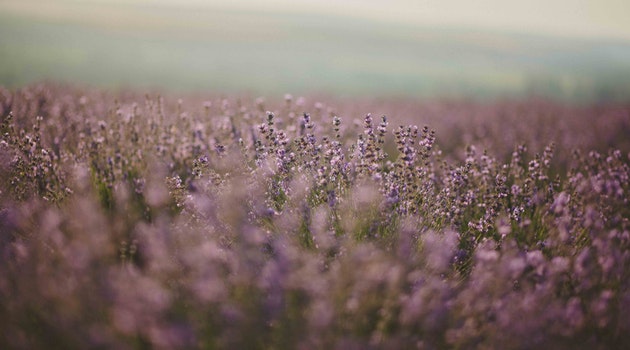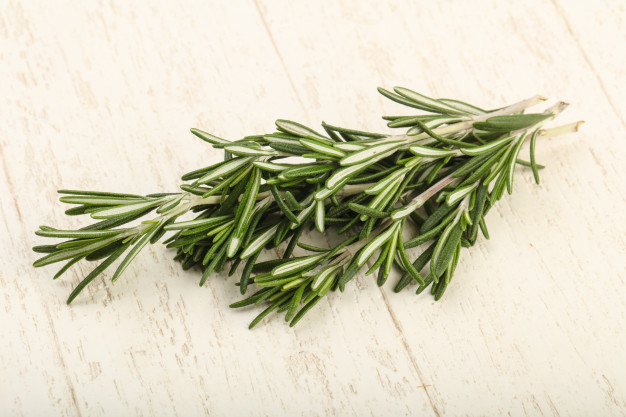Landed here because you’re looking for natural mosquito repellent tips? We’ve done the research—and firsthand testing—and are sharing a comprehensive guide to natural ways you can tell mosquitoes to “buzz off” once and for all.
You keep wondering why these insects easily locate you. Well, mosquitoes use maxillary palp (a unique organ) to sniff the carbon dioxide from your breath.
They love to feed on their prey’s blood, especially the female mosquitoes (given that the males don’t bite). This is because blood is a rich source of proteins that they need for egg development.
Table of contents
- Dangers of Mosquitoes and Why You Need to Use Mosquito Repellent
- Why Mosquitoes Prefer One Person over Another
- Mosquitoes Transmit Illness to Pets, Too!
- The DEET Danger
- Natural Mosquito Repellents
- Predators That Eat Mosquitoes
- 7 Essential Oils That Are Natural Mosquito Repellents
- Homemade Mosquito Repellent (using essential oils)
- 10 Plants That Serve as Natural Mosquito Repellents
- Bonus Tip: Don’t Let Water Stand in Your Yard
- The Bottom Line on Using These Natural Mosquito Repellents
Dangers of Mosquitoes and Why You Need to Use Mosquito Repellent
Mosquitoes are more than a mere minor nuisance. They leave bites that vary from mildly itchy to swollen, painful, and even can get infected.
Pierces and bites from a mosquito provide an opportunity for them to transmit nasty viruses.
Here’s an overview of some of those dangerous viruses transmitted by mosquitoes.
5 Diseases transmitted by mosquitoes
These are only five of the many dangerous infections spread by mosquitoes. Sadly, while medical treatment is available, these conditions continue to remain deadly worldwide.
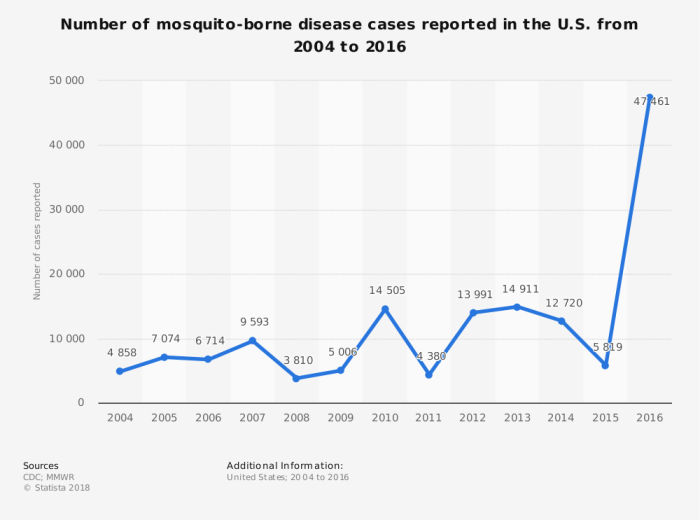
1 – Malaria
Over 438,000 people around the globe contract mosquito-borne malaria. The illness starts with flu-like symptoms and rapidly progresses as it destroys the body’s red blood cells. Eventually, untreated malaria increases severity, including convulsions, seizures, and death.
2 – Anaphylaxis
Anaphylaxis from a mosquito bite is a lesser-known health complication. While it’s not a blood-borne disease like the others we share, it can lead to death, so it is worth noting. Based on the findings of the American Academy of Allergy, Asthma, and Immunology, this is a rare allergic event—but extremely dangerous.
We know that technically this is not a disease. However, because it it life-threatening, we felt it was worth a mention.
3 – West Nile Virus
West Nile Virus is a dangerous ailment because, according to the Centers for Disease Control and Prevention (CDC), 80 percent of those infected don’t display any symptoms. This means that the disease runs its course undetected. Eventually, the illness impacts the central nervous system before it’s detected. This disease takes weeks of recovery, and 1 in 10 infected patients die.
4 – Zika Virus
Zika Virus is typically a less complicated mosquito-borne disease. However, there is a dire consequence for pregnant women. Research conducted by the Fogarty International Center about Zika Virus during pregnancy is frightening. Zika can cause abnormalities to in-utero babies, including congenital disabilities.
5 – Yellow Fever
The yellow fever virus begins with a sore throat and eventually causes inflammation throughout the body. Many attribute the initial symptoms to allergies or a cold. This disease has historically swept across Southern Asia and the African continent. However, a severe outbreak claimed 10 percent of Philadelphia, PA’s residents in 1793.
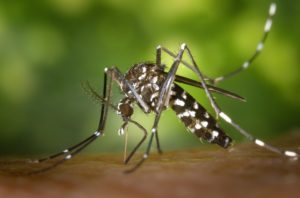
Why Mosquitoes Prefer One Person over Another
Are you a person who gets swarmed by pesky skeeters while the person next to you remains unbothered? You may have wondered if they actually find you more attractive for some reason. And the fact is, they do!
According to the leading expert with American Mosquito Control Association:
“There is no question that some individuals are more attractive to mosquitoes due to chemicals they secrete from their skin and from their particular skin flora.” –Joseph M. Conlon
In short, you are the protein source, and theses pests find you sweeter.
Here are some factors that attract mosquitoes, according to research.
Type O Blood
Mosquitoes seem to have a “taste” for people with type O blood. That’s according to a report by the Journal of Medical Entomology.
“Type O individuals may share a propensity for exuding certain odors that mosquitoes find attractive.” –Joseph M. Conlon
This preference helps explain why some people are unbothered while the pests love to feast on the skin of some other people!
Sweating
You are right if it feels like the mosquitoes get worse the longer you remain out in the heat. As you sweat, you secrete small amounts of lactic acid, a mosquito attractant. Combine that with the fact that mosquitoes attract your body heat, and you become the perfect bait.
Pregnancy
Mosquitoes have nerve receptors to help them locate CO2 sources (i.e., breathing mammals to feed on). Women who are 28 weeks or more along in their pregnancy exhale 21 percent more CO2 than other women.
You Drink Beer
Consuming beer could elicit a mosquito bite. PLOS ONE conducted a study of males. They broke the men into two groups. While one group drank water, the other group drank beer. The results?
“Beer consumption consistently increased volunteers’ attractiveness to mosquitoes.” –PLOS ONE study
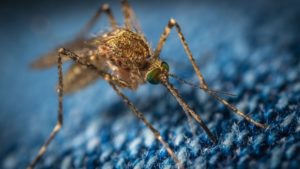
Mosquitoes Transmit Illness to Pets, Too!
Sadly, it’s not only humans that are impacted by these insects. Mosquitoes also transmit illnesses to your pets. If you have dogs or cats, they are also susceptible to several viruses.
Mosquito Protection for Dogs and Cats
According to Statista, Americans own 89.7 million canines. And the Insurance Information Institute reveals that Americans own 47.1 million cats. We love our pets and treat them as part of the family. Here are some of the diseases that dogs and cats contract from mosquito bites.
Heartworm
Perhaps the best-known of these illnesses is Heartworm. As they puncture the skin of a canine, they transmit a parasite called heartworm into the dog or cat’s bloodstream. They breed inside the heart, liver, kidneys, and lungs blood vessels. The continuously growing colony forms a blockage that can become fatal if not detected.
Skin Infections
The mosquito bite itself can cause the onset of a skin infection. Due to the inflammation, pets will scratch and nip at bites, introducing bacteria into the wound. Sometimes these heal fine on their own. However, they may also fester and become bacterial infections that require medical treatment.
West Nile Virus
Most people don’t realize that West Nile Virus (described above) affects dogs and cats and as well as humans. The symptoms in canines are similar to those of human manifestations. Cats contract Feline Heartworm. Unfortunately, by the time cats develop any symptoms, it’s often too late to save them.

The DEET Danger
So, now you’re wondering why you wouldn’t just spritz liberally with a DEET-containing bug spray and go about your business.
DEET, short for N, N-Diethyl-meta-Toluamide, is a highly effective chemical mosquito repellent. Once applied, the Environmental Protection Agency states that it will protect users against attacks by mosquitoes for anywhere from two to twelve hours.
Sounds excellent—at least on the surface. However, there’s a dangerous downside to using products that contain DEET.
On the other hand, you are applying chemical compounds to your skin. While the EPA insists that topical use of these products is safe, DEET was banned across much of Europe almost two decades ago after the toxicity was confirmed.
Because of the conflicting data, users are wary. And shouldn’t you be? Nobody is responsible for your wellness but you, ultimately.
So why not try going the natural way to keep the mosquitoes at bay? You will protect your skin as well as your overall health.
Natural Mosquito Repellents
Perhaps one of the best things about these natural repellents, other than mosquito control, is that they’re not toxic and are environmentally friendly.
To begin with, here are the predators you can rely on these hunters for bug depopulation.
Predators That Eat Mosquitoes
Here are a few predators to help keep your mosquito population in check.
Bats
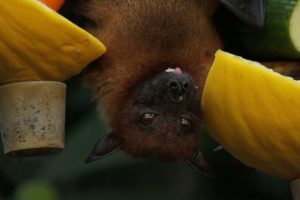
These night-time hunters primarily feed on a range of insects that fly at night, including mosquitoes.
Though not a large meal, bats prefer mosquitoes to the other big prey. The reason being—mosquitoes are exceptionally easy to catch and aren’t evasive action takers.
Song Birds
Here are three songbirds that are voracious mosquito-eating machines.
Purple martins
Purple martins are popularly known for their agility, which is handy in their hunting mission. They mainly exhibit an insectivorous diet and feed primarily on beetles, mosquitoes, moths, dragonflies, and flies.
The birds feed while in flight, which is why they fly with their mouths open–to catch any prey that comes their way.
North American’s most giant swallows love communal nesting, and so putting up a purple martin house in your yard, is a perfect way to attract them and depopulate mosquitoes hanging around your home.
Warblers
Warblers are very different in feeding habits compared to the other songbirds.
Additionally, warblers consume spiders, lice, millipedes, centipedes, fruits, and seeds.
Even though they eat mosquitoes, you’ll often see them going for the culling insects. And so, they shouldn’t be used as the primary means of mosquito control–although they can’t hurt, either!
Barn Swallows
They belong to the same family as purple martins and warblers, and they also feed on a wide range of flying insects, including mosquitoes.
But maybe the most interesting distinguishing factor between the three is that barn swallows are very selective in feeding and pursue their prey one at a time. They also fly a little bit lower than the purple martins. Therefore, they can make contact with and feed on many mosquitoes.
Koi
This type of fish is trendy in Japanese culture, as they believe it represents material and spiritual abundance.
To those of us who loathe the mosquito, koi fish serve as one of the most effective weapons when it comes to mosquito control.
As you may know, mosquitoes begin life as aquatic organisms. The female mosquito lays eggs (usually on the surface of any stagnant water or next to a water source), which then hatch into larvae after a few days.
You can imagine a single female mosquito laying 100-200 eggs! That equals hundreds of larvae-turn-mosquitoes.
Koi mercilessly feed on these larvae and prevent mosquito repopulation. Their outstanding effectiveness is perhaps the primary reason why most mosquito control agencies prefer them (koi) over the other mosquito larvae predators.

Turtles
Turtles have a varied diet ranging from crustaceans, snails, algae, water plants, and to aquatic insects and larvae.
However, the red-eared slider turtle stands out as the mosquito larvae’s most rapacious feeder (among the turtle species).
Dragonflies
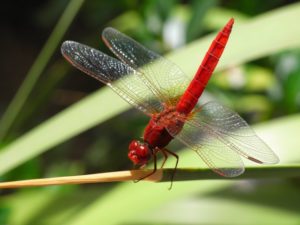
Right from the nymph stage, dragonflies feed on mosquito larvae and worms and other aquatic insects.
After their aquatic life stage, they proceed to prey on adult mosquitoes, though not as much as they do in their early stages of life. This shift speaks to the fact that adult dragonflies are mostly daytime feeders and not nighttime when mosquitoes are at their peak of activeness.
Often the female mosquitoes that go near water sources to lay eggs during the day are the primary sources of their nutrition.
Chickens and Ducks
One of the funniest things about female mosquitoes is that when they’re ripe for the egg-laying process, they don’t exclusively feed on human blood. They extend their itchy bites even to the birds, and the ducks and chickens aren’t an exemption to their nuisance.
Despite the frequent bites, ducks and chickens rarely suffer from vector-borne diseases, as with human beings.
Ducks, specifically, are hardy and impervious to most parasites and diseases. They hunt for pests and insects such as (but not limited to) grasshoppers, potato beetles, and mosquitoes. They take so well to water and devour mosquitoes from their aquatic stage and proceed to eat the adults on land as well.
Regardless of your area’s climate, you can rear these capable insect and pest control “animals.” Indeed, they adapt well to any environment, including the wettest tropical rainforests, deserts, and the cold North.
Chickens are also good eaters of these highly irritating insects. So, if you keep chickens, let them walk freely in the yard to enhance the depopulation of the insects. However, be sure to do so only when your plant crops are mature enough and tough to discourage the birds from feeding on them.

Spiders
Though not their main meal, spiders prey on mosquitoes occasionally when in the mood for such a meal.
However, two spider species, Paracyrba wanlessi, and Evarcha culicivora are also known as professional mosquito assassins. They exhibit an exclusive appetite for the insects. And in most cases, you’ll find them ignoring other insects to pursue their target—the mosquito.
Each of the two spiders exhibits different feeding approaches.
Evarcha culicivora (aka the vampire spider) primarily resides in East Africa around the Lake Victoria region. There, it quickly lands its favorite blood-filled female Anopheles mosquitoes when hunting.
Studies prove that Evarcha culicivora (a hard-to-come-by insect that chooses dinner strictly based on the prey’s diet) not only preys on the blood-filled mosquitoes for meals but also for an additional reproductive gain. In fact, it enhances their attractiveness in the spider-dating scene.
Paracyrba wanlessi, on the other hand, isn’t very selective when it comes to mosquito hunting. This spider species (commonly found in the Malaysian bamboo forests) feeds on both the adult mosquitoes and their larvae regardless of whether the prey is blood-filled or not.
However, research findings indicate that Paracyrba wanlessi prefer adult female mosquitoes to all other preys, including mosquito larvae.
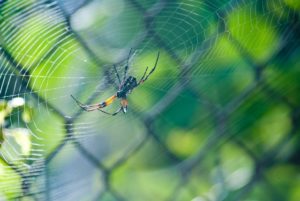
Frogs and Tadpoles
Frogs and tadpoles occasionally feed on both mosquitoes and their larvae. They enjoy feeding on the suspended plant materials like algae and vegetation in general–including any baby skeeters that happen to be attached. And the most interesting is the fact that they (tadpoles) sometimes compete for food with the very mosquito larvae they prey on.
However, the green tree frog, giant tree frog, and spadefoot toad (North American tadpole species) are well known for their sharp skills when it comes to hunting mosquito larvae.
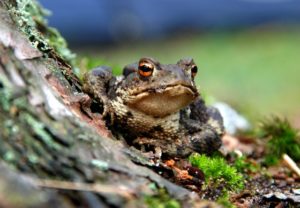
Ants
The ant is probably the most intriguing mosquito predator owing to its ability to fish out mosquitoes from their hide-outs. Mosquitoes love bushes and water sources, and plant leaves or stems with some water standing on them aren’t an exemption when it comes to this.
Camponotus schmitzi, a Borneo-native ant species resides inside the stems of the fanged pitcher-plant (Nepenthes bicalcarata), with which they kind of share a symbiotic relationship.
The ants swim under the water, usually found in the pitcher plant, to feed on mosquitoes and their larvae. This, in turn, helps prevent the mosquitoes from ripping off the plant of its nutrients.
Mosquitoes
Surprised? Yes, not all mosquitoes bite or spread vector-borne diseases.
Toxorhynchites rutilus, also known as mosquito eater, is the biggest mosquito in the USA, with the adult female estimated to exhibit a wingspan close to a ½ inch.
Unlike the female Anopheles mosquitoes, they don’t need to feed on blood to enhance their egg production, and hence don’t bite.
In fact, both female and male Toxorhynchites rutilus mosquitoes feed exclusively on sugary stuff such as honeydew, flower nectar, and plant sap. But you can also spot them on rotting fruits as they suck the juice.
It’s their larvae that eat up the mosquito larvae.
7 Essential Oils That Are Natural Mosquito Repellents
As noted earlier, some people are more prone to mosquito bites than others. To refresh your memory, mosquitoes hunt by:
- body heat
- the carbon dioxide we exhale
- smell
However, applying specific essential oils to your skin can help reduce your susceptibility to their bites. When you utilize essential oils, don’t apply them directly to your skin. Instead, dilute it in a carrier oil before application.
Below are some of the most effective essential oils you can use to keep these predators off yourself:
Citronella essential oil
Citronella oil extracts from the stems and leaves of the citronella plant, a plant in the lemongrass family. This species thrives well in warm climates but can also be grown indoors in areas prone to cold. Aptly, the plant’s nickname is “mosquito plant.”
Applying citronella oil to your skin helps repel mosquitoes by masking the lactic acid scent and carbon dioxide your body emits. Therefore, it makes it difficult for the insect to locate you.
Though maybe effective on mosquitoes, you’ll have to reapply the oil after every 20-30 minutes as it evaporates very fast. This is unlike DEET or other chemical mosquito repellents which can go for hours before a reapplication is required.
Note: Citronella oil can cause skin irritation in some people, and so exercise some caution when using it. You can apply a small amount of the oil to a section of your skin to see if it works for you.
A more full application is only recommended in case of no allergic reactions.
Lavender essential oil
Other than repelling mosquitoes, lavender can also be used to soothe and calm the skin from the itchy effects of mosquito bites. This stems from its antifungal, antiseptic, and analgesic properties.
It’s among the mosquito deterrent options you can use without necessarily having to spend money.
The plant is easy to grow as it requires little maintenance and can survive both indoors and outdoors.
Crushed lavender flowers produce the much-needed oil to prevent mosquito bites. So, consider rubbing it onto your skin, especially on the bite-sensitive parts of your body like the arms and ankles.
Peppermint essential oil
Peppermint essential oil is beneficial and efficient in the elimination of mosquito larvae, and also an excellent repellent against the dengue vector.
Research indicates that the application of the oil helps protect (for up to 150 minutes) from Aedes aegypti. The disease is the yellow fever mosquito, capable of spreading various conditions such as dengue fever, Zika fever, and Chikungunya.
Sweet basil essential oil
Sweet basil essential oil is usually extracted from the plant’s stems, leaves, and flowers, and serves delicious dishes; hence a popular herb oil in the kitchen.
However, its use extends far beyond the kitchen borders. Sweet basil contains phytochemicals (among many other compounds) which are strong bug repellents.
Catnip essential oil
This essential oil is made from nepetalactone, which makes it a more effective mosquito control option than the store-bought repellents utilizing DEET. Only one-tenth of catnip essential oil is required to be as effective as DEET. And so, you can imagine the strength!
Topical use guarantees protection against mosquito bites and also helps with skin rejuvenation.
You can choose to apply the crushed catnip leaves (if you have the plant) or the essential oil, which should be in dilute form. To dilute it, mix with aloe vera gel or unscented body lotion.
Just keep in mind that your cats will now be attracted to you, the same way they’d be attracted to the catnip plant itself.
Clary sage essential oil
Clary sage oil is widely utilized for its insect repellent properties, primarily when used with a diffuser. While it helps repel mosquitoes, this essential oil also has antidepressant effects and is believed to offer stress relief.
For maximum protection from mosquito bites, consider blending the clary sage oil with a carrier oil before applying it to your skin.
Tea tree oil
The uses of tea tree oil are diverse. The uses of tea tree oil cover a broad range of use, so it is a powerful multi-tasker. Because it offers antibacterial, antifungal, and antiseptic properties, this essential oil is a useful item to keep in your home.
You can use it for pest control, killing bad breath, tick removal, as laundry detergent and as a mosquito repellent, among many other uses.
Applying the oil directly to the insect’s bite offers quick and long-lasting relief from itching; a healing benefit that applies even to common skin issues such as Eczema, blisters, and bruises.
Homemade Mosquito Repellent (using essential oils)
By now are you wondering how to put those essential oils to use and make a homemade mosquito repellent?
Here’s a “recipe” for a super-effective treatment using essential oils that repel mosquitoes. Personally, I use this daily. Because it contains lavender and clary sage, it is safe to apply to my dog on those especially “buggy” summer nights.
How to Make to Make an Effective Homemade Mosquito Repellent:
Supply List:
- One 8 oz salon-style spray bottle – this type sprays an ultra-fine mist which is ideal for distributing the repellent evenly onto your skin
- Lavender essential oil – 40 drops
- Clary sage essential oil – 12 drops
- Distilled water – 5 oz.
- Witch hazel – 1 oz
- Jojoba oil – 1 oz
Add all the ingredients to the bottle. Cap it and give it a brisk shake. You will find that the jojoba oil separates, so you’ll need to shake it every time you apply it. If this bothers you, you may omit the jojoba oil. However, I like the way it makes the homemade mosquito repellent stick to the skin without feeling oily or greasy. The oil also adds weight, enabling the mixture to propel out of the bottle evenly.
Essential oil purists will advise you to mix your EO’s in a glass bottle. Typically, I agree. However, I take this with me outside and in a tote bag all summer long without fear of breaking the glass. Plus, I use it so quickly I don’t worry about product breakdown from the plastics.
Because it’s natural, you can reapply it as often as needed without concern about dangerous chemicals!
I am sharing with you the cute label that I made for my homemade mosquito repellent bottle. Feel free to print it and use it!
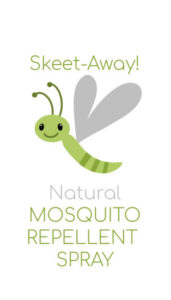
10 Plants That Serve as Natural Mosquito Repellents
Planting these around your yard and patio can help deter these pesky buggers!
1 – Citronella
This tropical plant thrives well in warm weather and enjoys full sun. Though often confused with some varieties of scented geranium, citronella itself resembles thick grass and doesn’t exhibit broad rippled leaves.
Its pleasant lemon smell is a strong mosquito repellent and the reason for its use in the production of commercial repellents.
2 – Sweet Basil
Basil is a prevalent flavor in many Italian dishes, and having your own is a great way to enjoy delicious salads and sauces regularly.
The plant exhibits a natural aroma that doubles as a mosquito repellent and a killer to the mosquito larvae. In fact, having it next to standing water ensures zero breeding by the female mosquitoes, which love hanging around water sources.
It does well in zones 10 and above, of course, when planted in well-drained soil. But allow for full sun exposure.

3 – Peppermint
Planning some outdoor evening party? Then it’s likely you’ll somehow make contact with the uninvited guests—mosquitoes.
Rubbing peppermint leaves on your exposed skin is a great way to ensure these insects remain in their rightful places.
You can choose to grow peppermint from its seeds or request some stems from your neighbors and friends.
Remember the soil should be well-drained, and exposure to sunlight is mandatory for maximum growth. When it comes to harvesting, ensure you do it from the top of the plant to allow for maximum spreading on the sides.
4 – Lemon Balm
Lemon balm is a great insect attractor and repellent at the same time. Butterflies and other beneficial insects, such as bees, love to spend their day on the plant’s tiny, pretty flowers, where they aid the pollination process.
However, lemon balm’s scent makes it a no-go zone for mosquitoes.
The plant thrives well in cool weather, requires full sun (though can also tolerate the shade), and fertile, well-drained soil. Almost any soil type with a PH value of 6.7-7.3 will do. Just ensure that the soil is well-drained.
While growing it in your garden, keep in mind that this hardy perennial herb reseeds and easily spreads in the garden. So to prevent it from taking over your yard, consider growing it in a plant container as this helps contain the roots.
5 – Geranium
Geraniums are outdoor plants that thrive well in warm and dry climates. They can be grown in planters, especially in cold climates, with pruning to enhance blooms.
It’s the strong lemon scent from these blooms that drives away mosquitoes and other pests to give you the freedom to head outdoors to enjoy the cool breeze.
These plants often flourish in existing soil, so no need to amend the soil. However, ensure the soil is well-drained to prevent the plant from rotting.
6 – Garlic
This seasoning is another excellent plant to have in your yard to keep mosquitoes away.
Mosquitoes dislike the strong garlic scent and can’t even dare feed on your blood once you consume the garlic leaves. The taste and odor in your bloodstream make you less appealing to them.
7 – Catnip
Catnip belongs to the larger mint family and exhibits a pleasant scent that even cats find irresistible. Humans, too, find it relaxing. However, it’s a different story for the mosquitoes.
The Nepetalactone, a chemical found in catnip, is a powerful mosquito repellent. In fact, research studies prove that the plant is 10X more effective at repelling mosquitoes as compared to DEET—which is commonly used in the manufacture of commercial insect repellents.
The plant matures faster and requires little maintenance. If you have this plant indoors, ensure a prime location, preferably a sunny window, for enhanced growth.
The location should be high enough (either on a hanging basket or a high shelf) to prevent your cat from messing up the plant.
Water regularly and remove the flowers (as they develop) to allow for the growth of more leaves. Depending on the space on your windowsill, you may have to divide the plant as it often gets large over the seasons.
8 – Marigolds
If you’re an ardent gardener, then marigolds are a great choice to aid your pest control efforts.
The easy-to-grow annual flower exhibits a strong smell that drives away mosquitoes. Additionally, it deters destructive pests such as tomato hornworms, aphids, Mexican bean beetles, thrips, and whiteflies.
Marigolds are a common addition to vegetable gardens and also make great border plants. Grow them in moderately fertile, well-drained soil and ensure full sun exposure. They dislike cool, shaded, and moist areas as they’re susceptible to powdery mildew, which compromises their blooming.
Perhaps one of the premium benefits of this showy, flowering plant is that it can withstand scorching summer and hence offer the much-needed protection from the nagging insects despite the heat.
9 – Lavender
Lavender is one of those plants you won’t want to miss this planting season. This is because lavender is known for its soothing and calming effects, which help promote quality sleep.
Though most people love its sweet fragrance, a few individuals still experience allergic reactions when exposed to the plant.
Mosquitoes and gnats also find the scent unbearable and thus keep off. And if you’ve got moths in your wardrobe, try putting some dried lavender leaves inside the wardrobe to help keep the insects at bay.
The plant isn’t easy to grow from seeds, so you’d better get some cuttings from a neighbor. Full sun exposure is mandatory. Also, ensure that the soil is well-drained to give the plant the necessary nutrients.
Note: When preparing the soil for planting, do not add organic matter. This is because the plant requires low to moderately fertile soil, or a neutral to slightly alkaline soil type.
10 – Rosemary
Rosemary is a popular seasoning that you’ll come across in almost every dish. But did you know that it’s additionally an optimal bug repellent?
It exhibits a woody scent that helps repel mosquitoes while keeping carrot flies and cabbage moths away.
The plant is easy to grow and care for, and it flourishes in hot, dry climates. However, when planted in containers, it will still do well in winter-prone areas.
Bonus Tip: Don’t Let Water Stand in Your Yard
Standing water. It’s the place that mosquitoes seek out to lay eggs. Learn more in this section.
Fountains, Ponds, and Swimming Pools
Standing water is the most conducive breeding ground for mosquitoes. A wet and still location is where they will hatch their offspring.
If you have a fountain, koi pond, or swimming pool, ensure that your pump works well and keeps the water moving. You will attract mosquitoes in double time if it becomes clogged or fails to keep the water in motion.

Bird Baths and Butterfly Puddles
Don’t feel like you need to give up your efforts at attracting birds and butterflies to your yard. You can still fill a birdbath and create butterfly puddles. However, you should plan daily maintenance. Tip the water out every day, rinse it out, and add fresh water.
The good you are doing in attracting birds (those natural predators we discussed) could outweigh the risk of attracting mosquitoes—especially if you are emptying the basins each day.
Storm ditches
There is little you can do with your storm ditches. However, keep them clear of leaves, grass clippings, and other debris. This cleanliness will allow the water to move through faster and dry out more quickly once the rain ends.
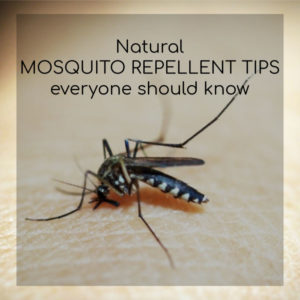
The Bottom Line on Using These Natural Mosquito Repellents
The warm season is here, and as usual, this is when most people indulge more in outdoor activities. Therefore, effectively utilizing your plants and essential oils to ward off these insects is a great way to ensure you enjoy every precious second of your outdoor time.
If you enjoy outdoor gardening, consider having several of the above repellent plants in your backyard or on your deck, porch, or patio. Remember, too, that you can opt for container gardening as it makes plant management easier, and it allows you to have the plant in your preferred spot.
Finally, learn how to grow, care for, and harvest these natural mosquito repellent herbs. You’ll be well on your way to controlling mosquitoes without DEET or chemicals.

